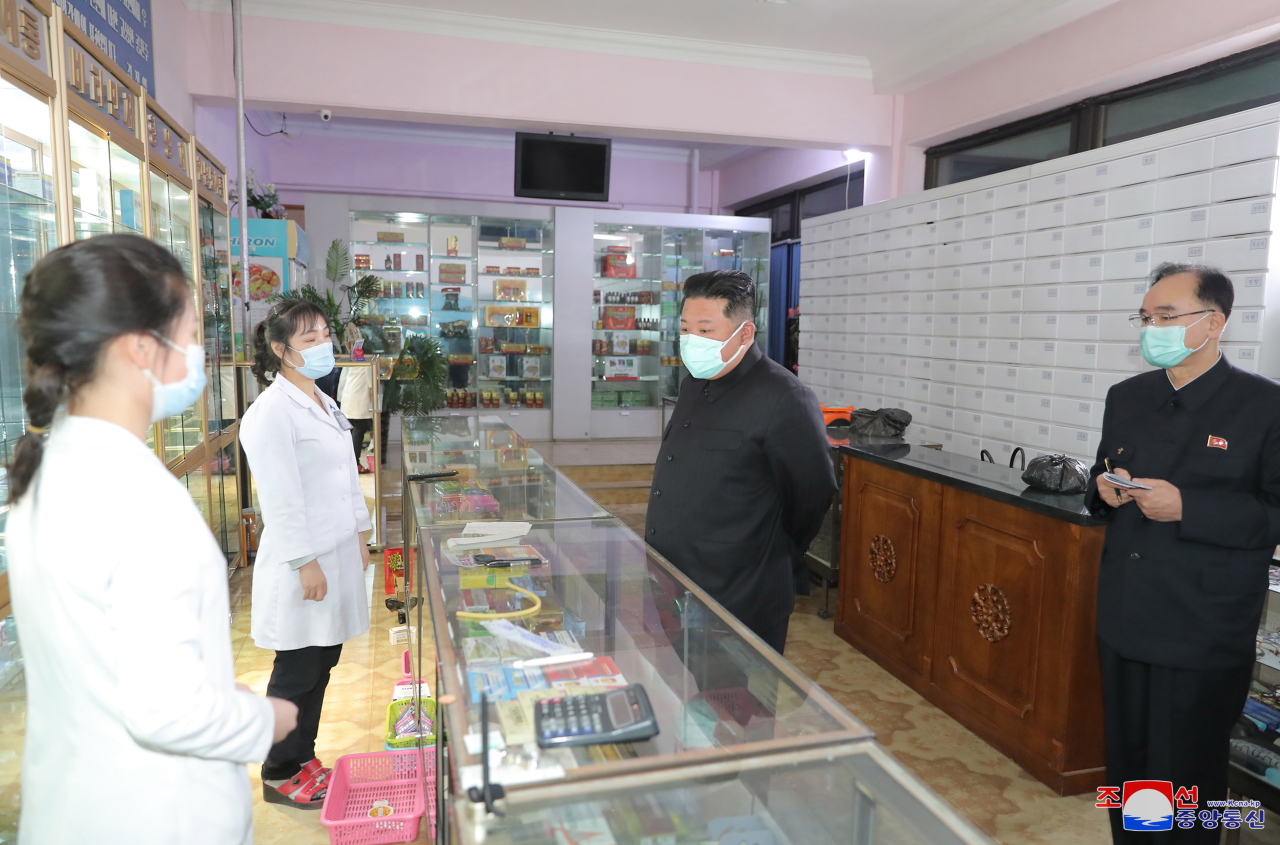North Korean leader Kim Jong-un reprimanded officials for failing to deliver medicine in time, and ordered the mobilization of the military to stabilize the supply in response to the COVID-19 outbreak, North Korea’s state media reported Monday.
Raising concerns over the virus spread, Kim also strongly criticized law enforcement officials for failing to prevent people from hoarding and illegally distributing the medicines, the Korean Central News Agency said.
“The fact that the medicine that the government distributes is not delivered to the pharmacies in time for the people shows that the officials directly executing the delivery do not properly understand the current crisis. It is derived from their inaction to actively carry out their duties, while they only verbally express the spirit of devotion,” Kim was quoted as saying.
The North Korean leader also visited pharmacies to check medicine supplies, according to KCNA. The report also pointed out the poor conditions of the pharmacies, describing them as “failing to maintain their core roles,” and that they do not have proper storage for medicines except for the display cases.
On Monday, South Korean President Yoon Suk-yeol reiterated his offer of aid to the North, promising “unsparing” effort, if the reclusive regime decides to takes it.
In his first administration speech at the National Assembly, Yoon said the offer comes regardless of the political and military situation on the Korean Peninsula.
“If the North Korean government accepts, I would lavish the necessary support (to the North) including medicines, medical appliances and medical staff, as well as the COVID-19 vaccines,” Yoon said.
“I have said several times that I would open doors to provide humanitarian aid (to North Korea) regardless of the political or military situation here.”
The president also acknowledged that Pyongyang has continued to ratchet up its nuclear ambitions, and that the government is aware of its preparation for a seventh nuclear test.
As of Sunday evening, North Korea recorded over 1.21 million people with fever symptoms since the end of April, according to Rodong Sinmun, the state-operated daily.
In the 24 hours from 6 p.m. Saturday, the North logged 392,920 fever cases and eight fever-related deaths.
The total deaths associated with the pandemic was 50, counted from the end of last month, according to reports.
While the North did say in its first confirmation of the COVID-19 outbreak on Thursday that it discovered the highly transmissible omicron virus, it has only reported an increasing number of patients with fever – which some interpreted as an apparent lack of test kits in the North to confirm the disease.
Observers say the actual number of the COVID-19 patients there may be much higher than what is officially reported.
Despite the grave situation, Pyongyang may not take the relief aid offered by Seoul.
South Korea’s Unification Minister Kwon Young-se, who was inaugurated on Monday, has sought to send a written notice to request aid coordination at 11 a.m. However, the message has not yet gone through, as Pyongyang has not responded as of 4 p.m.
Park Won-gon, a professor of North Korean studies at Ewha Womans University, said a rejection is highly possible, as accepting aid from the South could be the same as admitting that the North Korean leader Kim’s antivirus measures have failed.
“How they will receive the vaccines like Pfizer and Moderna also presents a problem, as they would have to keep a cold chain system,” Park told The Korea Herald.
The regime, however, may take basic medical supplies from its ally China, or take offers from the COVAX program, a global COVID-19 vaccine distribution mechanism led by the World Health Organization. The North rejected previous offers to be included in the program that delivers AstraZeneca and Sinovac vaccines.
The “explosive” spread of the virus may also hurt the regime’s nuclear ambitions, Park said. Intelligence agencies in Seoul and Washington have observed signs of the North preparing for a nuclear test at its Punggye-ri testing site, which would be its seventh since the last in 2017.
By Jo He-rim (
herim@heraldcorp.com)





![[Exclusive] Hyundai Mobis eyes closer ties with BYD](http://res.heraldm.com/phpwas/restmb_idxmake.php?idx=644&simg=/content/image/2024/11/25/20241125050044_0.jpg)
![[Herald Review] 'Gangnam B-Side' combines social realism with masterful suspense, performance](http://res.heraldm.com/phpwas/restmb_idxmake.php?idx=644&simg=/content/image/2024/11/25/20241125050072_0.jpg)

